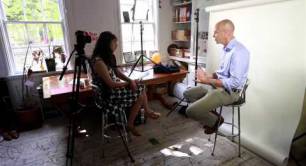Ashoka Changemaker Summit promises certainty in a tumultuous year
Could listening to social innovators help us find more certainty in the current crisis? Next week’s digital Ashoka Changemaker Summit 2020 will look at how key principles of social change, which have been tried and tested in the most difficult situations, can bring much-needed solutions to Covid-19 problems – and hopes to bring the sense of stability that we’re all craving right now.
Next week’s Ashoka Changemaker Summit has an ambitious aim: bringing back certainty. Drawing on its network of more than 3,800 social entrepreneurs, the digital summit will gather social entrepreneurs and business and philanthropy leaders from around the world for more than 100 sessions. These will explore how pre-existing, tried and tested solutions can help resolve some of the problems caused by Covid-19, and restore a sense of certainty to the world.
The key principles of social change developed over the years by social entrepreneurs have proved successful in times of adversity, according to the network.
“What's new for us, in the northern part of the world, has been a reality for the global south forever,” said Marie Ringler, leader of Ashoka Europe and a member of the organisation’s global leadership group. “I see all these fabulous entrepreneurial minds that empower people to find the solutions of really tough problems in the most difficult situations — in the midst of civil war, in the midst of extreme poverty, in the midst of earthquakes and their aftermath. They have already shown us so many times that they know how to deal with crises.”
Ashoka is calling on business leaders, policymakers and the wider public to listen more to these innovators. “Many impactful approaches for a resilient future are already there. We are just not yet applying them on a large enough scale,” said Ringler.
Among the approaches discussed at the summit, the principle of ‘system change’ — tackling the root of a problem rather than its symptoms — is necessary during the pandemic, according to Ringler.
Many impactful approaches for a resilient future are already there. We are just not yet applying them on a large enough scale
“What we’re seeing clearly in this crisis is all the broken systems,” she said. “Look at the current healthcare crisis. We continue to address the symptoms — adding another bed in intensive care — but we could also ask ourselves, if many of the people in hospitals are from vulnerable groups such as elderly people, and we have now seen that big care homes are a source of danger for these people, why are we continuing this practice?”
Ashoka’s 40 years of experience have revealed another key approach to sustainable social change that can be applied in a crisis: empowering people and communities. Indian social entrepreneur and Ashoka Fellow Jeroo Billimoria, who launched Childline, a free emergency phone service for children in need of help, said: “Whatever your intervention, make sure that it’s not you at the center of the intervention, but how you can benefit many people”. That echoes the Ashoka ethos, which argues that treating people like victims removes their agency and creativity.
The summit will also explore the idea of activating the public to drive institutional change. Ashoka fellow Stéphane Gigandet has managed to change behaviours in the food industry from the bottom up, by creating a “Wikipedia of food” — a website and app where users can upload the ingredients they find on food packaging, to help others better understand what they are eating. Starting by mobilising a community of food bloggers in 2012, Gigandet’s project slowly gained momentum, and now food brands cooperate with him directly. He also helped to set up a points system that rates food according to their nutrition value, which he hopes could one day become compulsory through a European directive.
This doesn’t mean social entrepreneurs are not facing uncertainty themselves, with the effects of the pandemic still unfolding. Anecdotal evidence from Ashoka’s Europe network shows that some sectors are faring better than others in terms of demand for services and financial sustainability.
For Ringler, while social entrepreneurs can bring solutions and certainty, they always need an ecosystem of support. She added: “One of the easiest things people can do, with or without money, with or without education, is to not say ‘it’s not possible’. Instead, say ‘how can I support you?’
“But of course, this is also a call for action to finance and fund social entrepreneurs and their systemic solutions.”
The Ashoka Changemaker Summit takes place 17-19 November.
Thanks for reading our stories. As an entrepreneur or investor yourself, you'll know that producing quality work doesn't come free. We rely on our subscribers to sustain our journalism – so if you think it's worth having an independent, specialist media platform that covers social enterprise stories, please consider subscribing. You'll also be buying social: Pioneers Post is a social enterprise itself, reinvesting all our profits into helping you do good business, better.




